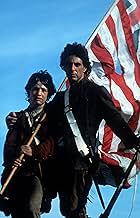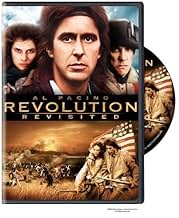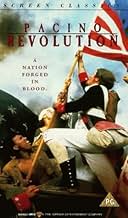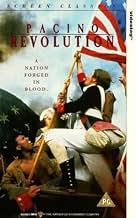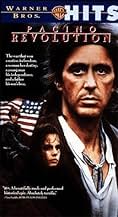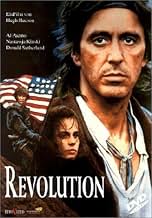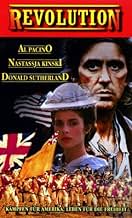IMDb RATING
5.3/10
7.9K
YOUR RATING
A trapper and his young son get pulled into the American revolution early as unwilling participants and remain involved through to the end.A trapper and his young son get pulled into the American revolution early as unwilling participants and remain involved through to the end.A trapper and his young son get pulled into the American revolution early as unwilling participants and remain involved through to the end.
- Awards
- 1 win & 4 nominations total
Cheryl Anne Miller
- Cuffy
- (as Cheryl Miller)
- Director
- Writer
- All cast & crew
- Production, box office & more at IMDbPro
Featured reviews
Searching for some short-length used videotapes, I found the laserdisc version of "Revolution," which I'd never seen. This non-letterbox, TV format version had the usual "talking to air" problem with 2.35:1 movies. Although a scratch and miscellaneous dirt made the picture skip/repeat/wobble, it was an interesting foxhole-level look at the American Revolution. The scenery, set design, costumes, and varied kinds of people made me think that this was Sergio Leone's take on The War for Independence. Was Al Pacino believable as a backwoods English colonist? No, but like a scratch running through a film, the "speech impediment" is overlooked as the tale unfolds. This film, unlike "The Patriot," shows camp followers, Indians on both sides, fighting women, "Not Worth a Continental" issues, lots of dirt and the conventions and results of 18th century warfare. Valley Forge isn't as grim an encampment as paintings and written records reported, but it's a close miss for the English countryside location. Are the characters believable? Hard to tell, since their histories and motives aren't complete. (Having the action jump place to place with jumps in time make this a "fill-in-the-missing-backstory" exercise found in James Clavell's book "Nobel House" series.) Is it an interesting movie? Definitely, and has that 18th century "fleas, dirt, and grease" look that is missing from "The Patriot." 7/10, for presenting issues and motives that turned English colonists into Americans.
I've watched this film several times over the years and was really surprised to learn (after checking it out on IMDB) that is was considered a flop at the time of its release! Also baffled completely by the relatively low rating.
I'm certainly not an expert on this historical timeframe and like most period films, I'm sure they got some things wrong. However, this gritty, grimy film seemed to me, what the time and place must have been like. In other words, it conveys a certain, almost documentary style realism, right down to the rather odd pacing of the film's plot. The film doesn't seem to build to a climatic ending, but rather plays out a slice of life in all its awkwardness. Compared to a film like, "The Patriot" (which contains some pretty outrageous Hollywood stuff), I find this somber film to better represent the period (in my mind).
Oh, I liked Pacino's performance! It isn't over the top. He seems like a regular fellow caught up in extraordinary events. Again, can't understand the overly critical review of his acting here. Ditto for Sutherland and Kinski.
Definitely worth watching if you're looking for something outside of a formula Hollywood "history" movie. I think it will become more highly regarded in its context as time goes on.
I'm certainly not an expert on this historical timeframe and like most period films, I'm sure they got some things wrong. However, this gritty, grimy film seemed to me, what the time and place must have been like. In other words, it conveys a certain, almost documentary style realism, right down to the rather odd pacing of the film's plot. The film doesn't seem to build to a climatic ending, but rather plays out a slice of life in all its awkwardness. Compared to a film like, "The Patriot" (which contains some pretty outrageous Hollywood stuff), I find this somber film to better represent the period (in my mind).
Oh, I liked Pacino's performance! It isn't over the top. He seems like a regular fellow caught up in extraordinary events. Again, can't understand the overly critical review of his acting here. Ditto for Sutherland and Kinski.
Definitely worth watching if you're looking for something outside of a formula Hollywood "history" movie. I think it will become more highly regarded in its context as time goes on.
I had wanted to see this movie for quite some time, but for some strange reason it never appeared on television despite its cast. However, I finally managed to find a copy of it at a specialized video store in my city. (The version I found was the director's cut.) So what did I think of it? Well, I admit that the look of the movie is very convincing. The costumes, props, and set decoration look fantastic. It really seems that they captured what the colonies were like more than 200 years ago.
However, the story and characters are less convincing. For example, the movie seems to suggest that most Americans were pro-revolution. In actual fact, a third were pro-revolution, another third were British loyalists, and the remaining third either didn't care or were undecided. Another odd fact is that the movie portrays just about all of the pro- revolutionists as despicable - odd because the filmmakers were trying to sell this movie to the American public! Actually, most of the other characters in the movie, like the British soldiers, are also shown in a negative light. There are precious few characters in the movie to care about. The actors try, but a lot of the roles are shallow. Donald Sutherland and Nastassja Kinski have little to do despite their billing.
There are other problems in the movie I could go on for some time listing, like Pacino's extensive yet completely unnecessary narration. Still, I will admit that while I didn't like the movie, I wasn't bored at any moment. There's plenty of eye candy, and I confess a curiosity as to how Pacino's character would end up. The movie isn't as bad as some critics have claimed... though I won't hesitate to add that it wasn't worth the years I searched for a way to see it.
However, the story and characters are less convincing. For example, the movie seems to suggest that most Americans were pro-revolution. In actual fact, a third were pro-revolution, another third were British loyalists, and the remaining third either didn't care or were undecided. Another odd fact is that the movie portrays just about all of the pro- revolutionists as despicable - odd because the filmmakers were trying to sell this movie to the American public! Actually, most of the other characters in the movie, like the British soldiers, are also shown in a negative light. There are precious few characters in the movie to care about. The actors try, but a lot of the roles are shallow. Donald Sutherland and Nastassja Kinski have little to do despite their billing.
There are other problems in the movie I could go on for some time listing, like Pacino's extensive yet completely unnecessary narration. Still, I will admit that while I didn't like the movie, I wasn't bored at any moment. There's plenty of eye candy, and I confess a curiosity as to how Pacino's character would end up. The movie isn't as bad as some critics have claimed... though I won't hesitate to add that it wasn't worth the years I searched for a way to see it.
Many of the bad reviews of Revolution point out that it is dirty, filthy, disgusting, muddy, messy and uncomfortable to watch. True, true, true.
But... THAT'S WAR!
As a child I thought the American Revolution was the cleanest and most honerable war in history, fought by idyllic patriots on the side of freedom against snooty, smug king-lovers. That's how it was depicted in my childhood history books. But as I got older I realized that the books must have been glossing over something, because it seemed utterly illogical that a war could be so clean and honerable. Wars are desperate and horrible blood-soaked experiences that rip relationships apart, destroy everything, and are fought at ground level by the most uneducated people of all, many of whom really have no choice in the matter and are merely fighting for their own lives.
Revolution demythologizes the American Revolution by dismissing many of the ideal illusions we have about that war in particular. The hero is a self-serving man, who has no interest at all in war, but is forced to fight in it against his will. He's a free man who is forced into virtual slavery to fight for his freedom. Does this make him a bad man? No, he's an honest man who is out for number one, and is motivated mostly by love and loyalty to his son. The war steals everything from him, so why should he be happy about it? There are a few true 'patriots' in this movie, gung-ho idealists like Daisy, but almost everyone else is in the war for selfish motives, to profit from the war, to assert power, to avoid starvation, or for the pure joy of war itself. The redcoats are depicted as rowdy london street-toughs, who are no more or less ignorant & petty than the Americans, only more cocky and egotistical. Their uniforms are ill fitting and poorly miantained. This and a thousand other details give this movie the air of truth. By the end the victory of America is all the more sweet due to the wretchedness the victors must slog through. It's a very noble thing to see war depicted in such realistic ways.
This movie might be too grim to take if not for the great love story at the center of it. Its an entirely unique love story in the history of film, because it demonstrates how a relationship can continue to grow over time even if the lovers are separated from each other for long periods. Daisy and Tom have only a few minutes worth of conversations in the entire movie, and those represent ALL of their conversations. Basically they cross paths from time to time, but they are interrupted every time, and must leave each other, unsure when or if they will ever see each other again. So although they don't really get to know each other or go on dates or have any kind of normal courtship, they nonetheless fall in love, basically thinking about each other over the intervening periods. It is really the war that allows them to fall in love in the first place. Without the war these two people from opposite sides of the social spectrum would never have socialized, and without American freedom they would never have been able to stay together. But in the throes of war all the social rules are off, and these two are so desperate for something good to enter their lives, they fall in love. I don't know why this touched me so much, but it did.
I find this movie emminently re-watchable. I love it. In comparison, Mel Gibson's bad rip-off "the Patriot" is unwatchable to me. It is so full of moral absolutes and is so organized and visually beautiful, I think it does a disservice to the reality of war.
But that's my taste. I love almost every grim-reality war movie. Catch 22, The Victors & Das Boot, to name a few.
But... THAT'S WAR!
As a child I thought the American Revolution was the cleanest and most honerable war in history, fought by idyllic patriots on the side of freedom against snooty, smug king-lovers. That's how it was depicted in my childhood history books. But as I got older I realized that the books must have been glossing over something, because it seemed utterly illogical that a war could be so clean and honerable. Wars are desperate and horrible blood-soaked experiences that rip relationships apart, destroy everything, and are fought at ground level by the most uneducated people of all, many of whom really have no choice in the matter and are merely fighting for their own lives.
Revolution demythologizes the American Revolution by dismissing many of the ideal illusions we have about that war in particular. The hero is a self-serving man, who has no interest at all in war, but is forced to fight in it against his will. He's a free man who is forced into virtual slavery to fight for his freedom. Does this make him a bad man? No, he's an honest man who is out for number one, and is motivated mostly by love and loyalty to his son. The war steals everything from him, so why should he be happy about it? There are a few true 'patriots' in this movie, gung-ho idealists like Daisy, but almost everyone else is in the war for selfish motives, to profit from the war, to assert power, to avoid starvation, or for the pure joy of war itself. The redcoats are depicted as rowdy london street-toughs, who are no more or less ignorant & petty than the Americans, only more cocky and egotistical. Their uniforms are ill fitting and poorly miantained. This and a thousand other details give this movie the air of truth. By the end the victory of America is all the more sweet due to the wretchedness the victors must slog through. It's a very noble thing to see war depicted in such realistic ways.
This movie might be too grim to take if not for the great love story at the center of it. Its an entirely unique love story in the history of film, because it demonstrates how a relationship can continue to grow over time even if the lovers are separated from each other for long periods. Daisy and Tom have only a few minutes worth of conversations in the entire movie, and those represent ALL of their conversations. Basically they cross paths from time to time, but they are interrupted every time, and must leave each other, unsure when or if they will ever see each other again. So although they don't really get to know each other or go on dates or have any kind of normal courtship, they nonetheless fall in love, basically thinking about each other over the intervening periods. It is really the war that allows them to fall in love in the first place. Without the war these two people from opposite sides of the social spectrum would never have socialized, and without American freedom they would never have been able to stay together. But in the throes of war all the social rules are off, and these two are so desperate for something good to enter their lives, they fall in love. I don't know why this touched me so much, but it did.
I find this movie emminently re-watchable. I love it. In comparison, Mel Gibson's bad rip-off "the Patriot" is unwatchable to me. It is so full of moral absolutes and is so organized and visually beautiful, I think it does a disservice to the reality of war.
But that's my taste. I love almost every grim-reality war movie. Catch 22, The Victors & Das Boot, to name a few.
This movie has consistantly been trashed by numerous professional and amateur reviewers alike. Even Leonard Maltin, my personal favorite movie guy, rated it a "BOMB". I can`t understand why. Although it isn`t a perfect film endeavor, it does tell a story that`s never been told before...but obviously in a manner that many found extremely annoying at best. Aside from New York and L.A. movie houses, I don`t believe this film was released nationally at any time. Personally, I thought it was a very different type of movie, but effective and entertaining in a strange way. It gave me a feel for the time period, including an appealing atmospheric identity. Being an ex-NewYorker and exposed to the famous Revolutionary battlefields, that still exist throughout the metro area, I felt an aura of actually being present in that time period, with events occuring on both surrealistic and realistic levels. Al Pacino is a born/raised New Yorker and I believe captured the essence of his character very well. Pacino gave a solid portrayal of an 18th. century individual caught up in a violent period of American history. This movie has been unfairly criticized and overly maligned in my humble opinion. A unique film deserving of more praise then it has been awarded. See it for yourself.
--------------------------------------------------------------------------- -----
--------------------------------------------------------------------------- -----
Did you know
- TriviaWhen Annie Lennox's character sings a song near the end of the movie, her voice is dubbed.
- GoofsIn battle, the British soldiers are depicted taking short steps; in reality, Redcoats were trained to take long paces, so as to close the range quickly.
- Alternate versionsIn 2009, Hugh Hudson made his own director's cut titled "Revolution Revisited" which was also released on DVD. The new version featured new narration recorded by Al Pacino, a different ending, and removed 10 minutes of footage from the film.
- ConnectionsEdited into Give Me Your Answer True (1987)
- How long is Revolution?Powered by Alexa
Details
Box office
- Budget
- $28,000,000 (estimated)
- Gross US & Canada
- $358,574
- Opening weekend US & Canada
- $52,755
- Dec 29, 1985
- Gross worldwide
- $358,574
- Runtime2 hours 6 minutes
- Color
- Aspect ratio
- 2.35 : 1
Contribute to this page
Suggest an edit or add missing content



